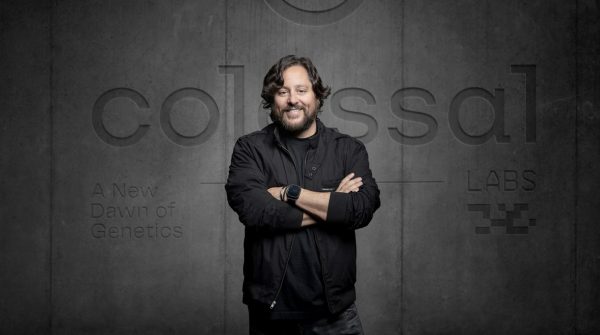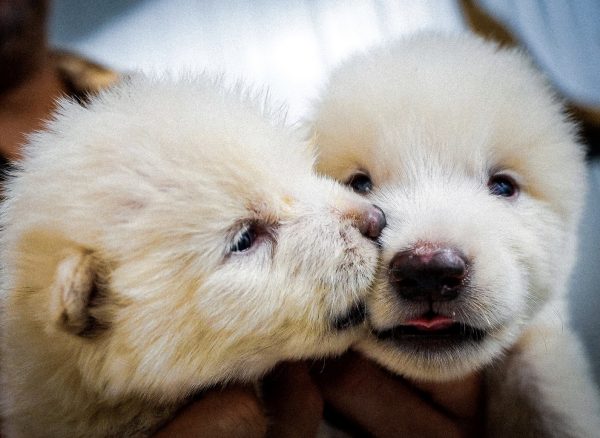Colossal is a bioscience and genetic engineering company that builds radical new technologies to advance the field of genomics. Colossal creates transformative technologies for the restoration of extinct species, the protection of critically endangered species, and the repopulation of critical ecosystems that support the continuation of life on Earth. The company is the first to apply CRISPR technology for species de-extinction, beginning with the woolly mammoth. Pulse 2.0 interviewed Colossal Biosciences founder and CEO Ben Lamm to learn more about the company.
Ben Lamm’s Background

Photo credit: Colossal
What is Ben Lamm’s background? Lamm said:
“I’ve been building and scaling innovative technology companies for the past two decades and have always worked at the intersection between pop-culture and technology. From that vantage point, I’ve anticipated trends and ideas before they’ve hit the market.”
“Before starting Colossal, I founded several companies across a range of industries, including Hypergiant Industries, which focuses on AI-driven solutions for critical industries like defense, space, and infrastructure and Conversable, a company at the leading edge of conversational intelligence. But, I have probably been an entrepreneur since I was a kid. Even as a teen, I was building businesses and realized very early on that corporate or employee life would never be for me.”
Formation Of The Company
How did the idea for the company come together? Lamm shared:
“I’ve always wanted to bring together great scientific minds to do game-changing things. I became interested in the possibility of de-extincting the mammoth when I read about it in a research journal. When I reached out to the expert in the field Dr. George Church, who is a pioneer in genetics and synthetic biology with decades of groundbreaking research, he told me how he had long been exploring the possibilities of using genetic engineering tools to bring back extinct species, particularly the woolly mammoth. During our meeting, I realized that the problem was not the science, it was the funding of the science.”
“As an entrepreneur who thrives on building companies around transformative technology, I saw an opportunity to create something extraordinary. Together, we envisioned a company that could use synthetic biology to solve some of the planet’s biggest challenges—not just by de-extincting species but by advancing tools and applications that could benefit conservation and even human health. It was this intersection of innovative science and a mission to make a global impact that truly brought the idea to life.”
“From there, it was about assembling the right team, aligning the vision, and securing the resources to make Colossal a reality.”
Favorite Memory
What has been your favorite memory working for the company so far? Lamm reflected:
“Impossible to say. The most exciting thing about Colossal is that every day we make progress towards our end goal, so each day brings with it a new discovery, a new advancement and a new scientific win that make it my new favorite day. I will say the first time I held the dire wolves Romulus and Remus was pretty special.”

Photo credit: Colossal
Challenges Faced
What challenges have Lamm and the team faced in building the company? Lamm acknowledged:
“Gene-editing technologies have revolutionized what’s possible in de-extinction science, but they are not without limitations. We are constantly working to improve their efficiency and also increase the number of edits that can be done at one.”
“Another obstacle lies in the biological systems required to bring these edits to life. For example, marsupial reproduction, crucial for the thylacine project, presents unique challenges, as does avian reproduction for the dodo project due to the lack of a traditional womb. Developing techniques for artificial reproduction is an ongoing area of innovation we are exploring in partnership with the Wyss Institute at Harvard.”
Evolution Of The Company’s Technology
How has the company’s technology evolved since launching? Lamm noted:
“We have built a suite of precision editing tools that allow us to make exact and efficient edits to the genomes of living organisms, which is essential for de-extincting key traits of extinct species. This has allowed us to introduce cold-adaptive genes—such as those responsible for thick fur, subcutaneous fat, and Arctic-adapted hemoglobin—into the genome of the Asian elephant for our woolly mammoth project.”
“These edits are not only highly targeted but also significantly reduce the time and resources needed compared to older methods of genetic modification. Similarly, for the thylacine and dodo projects, genome engineering has enabled us to edit genomes at a level of accuracy that allows the incorporation of extinct species’ genetic traits into the DNA of closely related living relatives.”
Significant Milestones
What have been some of the company’s most significant milestones? Lamm cited:
“Colossal built a suite of precision editing tools that have allowed us to achieve numerous world-first events since launching, including:
— The development of elephant IPSCs, which support our woolly mammoth project,
— A preventative vaccine for Elephant EEHV in trials – the leading cause of death in captive juvenile elephants, which supports our woolly mammoth project.
— Numerous advancements in marsupial assisted reproductive science, which will help with our thylacine de-extinction project.
— The largest edit of a single cell with over 300+ edits.”
– Advancement in avian cellular science, including successfully growing pigeon primordial germ cells (PGCs) for the first time in history, a pivotal step in bringing back the dodo. We have also established a flock of gene-edited chickens that will serve as potential surrogates for dodos and other endangered bird species and generated new genomic resources for exotic and endangered pigeons that will facilitate identification of editing priorities for the dodo de-extinction project. These advances significantly accelerate progress toward dodo de-extinction and broaden tools for advancing biodiversity conservation for birds. The advances Colossal has made now extend avian PGC culture technology beyond chicken and geese, opening a new frontier in avian reproductive science.
Funding/Revenue
When asking Lamm about the company’s funding details, he revealed:
“We just announced an additional expansion of $120 million in new funding with participation from USIT, Bob Nelsen, and Peter Jackson. This was an addition to the $200 million Series C we announced earlier this year, bringing this round of capital to $320 million. Since launching in September 2021, Colossal has raised just over $555 million in total funding. This latest round of capital places the company at a $10.32 billion valuation – which makes Colossal one of less than a hundred decacorn businesses in the world. We are proud of our status because it helps to confirm what we have always believed: people want to support the work behind de-extinction, save our animals and make the world better tomorrow than it is today.”
Differentiation From The Competition
What differentiates the company from its competition? Lamm affirmed:
“Sadly, there is no competition in this space. Colossal is the only company combating our de-extinction crisis. But luckily, we are doing it with dozens of academic, scientific and conservation partners.”
Future Company Goals
What are some of the company’s future goals? Lamm concluded:
“Colossal has one goal. We are focused on reversing and eradicating the extinction crisis.”


